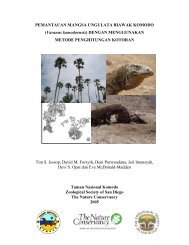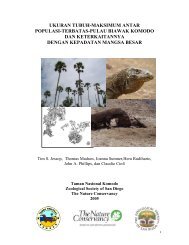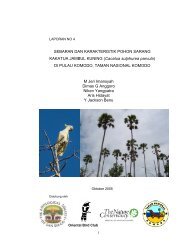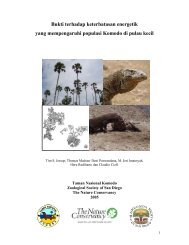Sustainable Financing of MPAs - Komodo National Park
Sustainable Financing of MPAs - Komodo National Park
Sustainable Financing of MPAs - Komodo National Park
Create successful ePaper yourself
Turn your PDF publications into a flip-book with our unique Google optimized e-Paper software.
force is not enough to protect the total area. The entry fees are not earmarked and therefore<br />
can not be used to create, for example, a bigger and better enforcement force. The<br />
management plan has a focus on the training <strong>of</strong> residents and staff in partnership with the<br />
tourism industry and the plan contains the building <strong>of</strong> support <strong>of</strong> local communities by<br />
community based initiatives and community based eco-tourism. There are no clear<br />
responsibilities defined. Nevertheless, the involvement <strong>of</strong> the local communities in<br />
participating in the conservation and protection <strong>of</strong> the biodiversity and the natural resources <strong>of</strong><br />
the park is taking place. The awareness <strong>of</strong> the importance <strong>of</strong> the national park as a World<br />
Heritage Site plays a major role and is a starting point for future revenues. The goal <strong>of</strong> Ujung<br />
Kulon <strong>National</strong> <strong>Park</strong> is to build a stronger conservation constituency to protect the park from<br />
future threats, which will be rather hard because Ujung Kulon <strong>National</strong> <strong>Park</strong> has a lot <strong>of</strong><br />
pollution problems from the domestic, agricultural and industrial activities on Java.<br />
5.3 Recommendations for the Ujung Kulon <strong>National</strong> <strong>Park</strong><br />
Ujung Kulon <strong>National</strong> <strong>Park</strong> has taken the first steps towards sustainability. But after<br />
having gone into the details <strong>of</strong> its management and finance structure, we can conclude that<br />
there is need for many improvements. Here we try to outline some recommendations how to<br />
improve the sustainability <strong>of</strong> Ujung Kulon <strong>National</strong> <strong>Park</strong>.<br />
Being a <strong>National</strong> <strong>Park</strong> <strong>of</strong> Indonesia, the Ujung Kulon <strong>National</strong> <strong>Park</strong> receives budgets from<br />
the national government, which should generate some revenues if the government could use<br />
the debt-relief swap system. Indonesia has big debts, which has a major impact on its<br />
economy. Regulated by the national legislation, Ujung Kulon <strong>National</strong> <strong>Park</strong> can pr<strong>of</strong>it from<br />
the decentralization process currently taking place. The denomination <strong>of</strong> the park as a World<br />
Heritage Site should appeal to international donors and be a tool to strengthen sustainable<br />
financing mechanisms <strong>of</strong> the Ujung Kulon <strong>National</strong> <strong>Park</strong> (Quintela et al. 2004). Ujung Kulon<br />
<strong>National</strong> <strong>Park</strong> can use this to leverage existing donations and revenues.<br />
To become more sustainable Ujung Kulon <strong>National</strong> <strong>Park</strong> should first achieve some<br />
stability <strong>of</strong> the revenues collected. The entrance fee to the park should be raised at least to the<br />
level required by law. Also other fees should be collected, i.e. licensing fees from the scuba<br />
diving operators. The revenues should be earmarked so that they remain in the use <strong>of</strong> the park<br />
and not disappear into central government. Eco-tourism should be further promoted, however,<br />
in a way that the increase <strong>of</strong> tourism takes place under controlled circumstances. This can be<br />
reached by organising training in marketing and by expanding the scale and diversity <strong>of</strong><br />
tourism related operations. Applying for a tourism concession to some big Indonesian tourism<br />
operator can positively contribute to this, as can be extracted from the <strong>Komodo</strong> experience.<br />
Whereas pollution and encroachment remain the biggest threats to the park, international<br />
community, especially development aid, should also focus on the community activities outside<br />
the park. This includes improving the infrastructure <strong>of</strong> the coastal areas (e.g. waste water<br />
treatment) and agriculture by developing an irrigation system to prevent the encroachment.<br />
Also the passing oil tankers pose a threat to the nature and therefore they should be charged<br />
with a special tanker fees.<br />
For biodiversity and conservation purposes it would be essential to create a conservation<br />
trust fund. To be really effective, i.e. patrolling in the area requires more resources. Local<br />
community should be furthermore encouraged to participate in the conservation <strong>of</strong> the park.<br />
28






